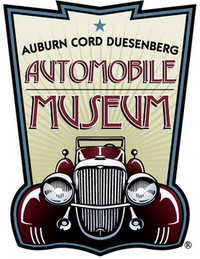Auburn Cord Duesenberg Automobile Museum facts for kids
 |
|
| Established | 6 July 1974 |
|---|---|
| Accreditation | American Alliance of Museums |
| Collections | Antique and Classic cars and related memorabilia |
| Collection size | 120 classic cars, antique cars, special interest cars |
| Owner | Auburn Automotive Heritage Inc. |
The Auburn Cord Duesenberg Automobile Museum is a cool place in Auburn, Indiana, United States. It's a museum all about amazing old cars! It opened its doors in 1974. The museum works hard to keep alive the history of cars made by three famous companies: Auburn Automobile, Cord Automobile, and Duesenberg Motors Company.
Contents
Explore the Museum Building
The museum is located in a very special building. It used to be the main office for the Auburn Automobile Company. This car company made cars here from the early 1900s until it closed in 1937.
A Historic Landmark Building
The museum building is part of a larger area that is a National Historic Landmark. This means it's a very important place in American history. The building, along with a nearby service building and another building, got this special title in 2005. This whole area is known as one of the best examples of how an independent car company worked.
Art Deco Design
The main showroom and office buildings were designed by an architect named Alvin M. Strauss. He designed them in the Art Deco style, which was popular in the 1930s. This style is known for its cool, sleek, and geometric shapes. The Auburn Automobile Company started out making carriages. At its busiest, it had a huge property, over 18 acres, right here.
What Happened After the Company Closed?
After the Auburn Automobile Company closed, the main office building was still used for cars. It became a business that sold original and new parts for old car brands. This included parts for Auburn, Cord, and Duesenberg cars. This business operated in the building until 1960.
Discover the Car Collections
The museum has seven different areas, called galleries. These galleries show off more than 120 cars. You can also see other cool things related to cars, like the old offices of the Auburn Automobile Company, which have been restored to look just like they did.
Interactive Exhibits
Some parts of the museum have interactive screens. These screens let you hear the sounds the cars make. You can also watch videos and see photos. These show you how the cars were designed and built. It's a great way to learn about the engineering behind these classic vehicles.
A Special Airplane Display
The museum even has an airplane on display! It's a Stinson Junior airplane. This exact plane was shown in the building when it first opened way back in 1930. It's like a little piece of history frozen in time.
See Also
 | Stephanie Wilson |
 | Charles Bolden |
 | Ronald McNair |
 | Frederick D. Gregory |

